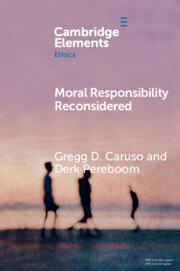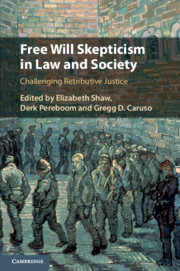30 results

Moral Responsibility Reconsidered
-
- Published online:
- 10 November 2022
- Print publication:
- 01 December 2022
-
- Element
- Export citation
Chapter 4 - A Forward-Looking Account of Self-Blame
- from Part I - The Nature of Self-Blame
-
-
- Book:
- Self-Blame and Moral Responsibility
- Published online:
- 05 May 2022
- Print publication:
- 12 May 2022, pp 77-94
-
- Chapter
- Export citation

Free Will
-
- Published online:
- 07 February 2022
- Print publication:
- 24 February 2022
-
- Element
- Export citation
Contributors
-
- Book:
- Free Will Skepticism in Law and Society
- Published online:
- 26 August 2019
- Print publication:
- 29 August 2019, pp vii-viii
-
- Chapter
- Export citation
Contents
-
- Book:
- Free Will Skepticism in Law and Society
- Published online:
- 26 August 2019
- Print publication:
- 29 August 2019, pp v-vi
-
- Chapter
- Export citation
Chapter 1 - Free Will Skepticism in Law and Society: An Overview
-
-
- Book:
- Free Will Skepticism in Law and Society
- Published online:
- 26 August 2019
- Print publication:
- 29 August 2019, pp 1-26
-
- Chapter
- Export citation
Part III - Free Will Skepticism and the Criminal Justice System
-
- Book:
- Free Will Skepticism in Law and Society
- Published online:
- 26 August 2019
- Print publication:
- 29 August 2019, pp 159-236
-
- Chapter
- Export citation
Part I - On the Practical Implications of Free Will Skepticism
-
- Book:
- Free Will Skepticism in Law and Society
- Published online:
- 26 August 2019
- Print publication:
- 29 August 2019, pp 27-96
-
- Chapter
- Export citation
Index
-
- Book:
- Free Will Skepticism in Law and Society
- Published online:
- 26 August 2019
- Print publication:
- 29 August 2019, pp 237-238
-
- Chapter
- Export citation
Copyright page
-
- Book:
- Free Will Skepticism in Law and Society
- Published online:
- 26 August 2019
- Print publication:
- 29 August 2019, pp iv-iv
-
- Chapter
- Export citation
Chapter 5 - Free Will Skepticism and Prevention of Crime
- from Part II - Alternatives to Retributive Punishment
-
-
- Book:
- Free Will Skepticism in Law and Society
- Published online:
- 26 August 2019
- Print publication:
- 29 August 2019, pp 99-115
-
- Chapter
- Export citation
Part II - Alternatives to Retributive Punishment
-
- Book:
- Free Will Skepticism in Law and Society
- Published online:
- 26 August 2019
- Print publication:
- 29 August 2019, pp 97-158
-
- Chapter
- Export citation

Free Will Skepticism in Law and Society
- Challenging Retributive Justice
-
- Published online:
- 26 August 2019
- Print publication:
- 29 August 2019
Contributors
-
-
- Book:
- The Cambridge Dictionary of Philosophy
- Published online:
- 05 August 2015
- Print publication:
- 27 April 2015, pp ix-xxx
-
- Chapter
- Export citation
3 - Free Will, Evil, and Divine Providence
-
-
- Book:
- God and the Ethics of Belief
- Published online:
- 25 July 2009
- Print publication:
- 06 June 2005, pp 77-98
-
- Chapter
- Export citation
Assessing Kant's Master Argument
-
- Journal:
- Kantian Review / Volume 5 / March 2001
- Published online by Cambridge University Press:
- 25 March 2011, pp. 90-102
- Print publication:
- March 2001
-
- Article
- Export citation
6 - Hard incompatibilism and criminal behavior
-
- Book:
- Living without Free Will
- Published online:
- 23 July 2009
- Print publication:
- 19 February 2001, pp 158-186
-
- Chapter
- Export citation
Introduction: Hard incompatibilism
-
- Book:
- Living without Free Will
- Published online:
- 23 July 2009
- Print publication:
- 19 February 2001, pp xiii-xxiv
-
- Chapter
- Export citation
Index
-
- Book:
- Living without Free Will
- Published online:
- 23 July 2009
- Print publication:
- 19 February 2001, pp 225-231
-
- Chapter
- Export citation
Frontmatter
-
- Book:
- Living without Free Will
- Published online:
- 23 July 2009
- Print publication:
- 19 February 2001, pp i-vi
-
- Chapter
- Export citation



